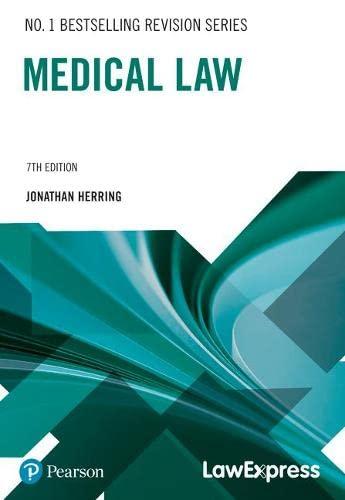Question
Legal Research (Ontario-Canada) 1. Analyze the following fact situation. The client, a Canadian charity called the World United Fund (the Fund), has come to your
Legal Research (Ontario-Canada)
1. Analyze the following fact situation. The client, a Canadian charity called the World United Fund (the Fund), has come to your firm with a problem. It recently ran a $1 million campaign to get donations to build a school in a poor country. Mrs. Euphemia Welsher promised to give $100,000; when the Fund had the entire $1 million in hand except for Mrs. Welsher's donation, it publicly declared the campaign successfully ended and hired an architect to draw up the plans for the school. Mrs. Welsher then told the Fund that she intends to give the money to a home for cats in New York City, where she lives (except for two months in the summer when she resides in Canada). The client wants to know whether it can sue Mrs. Welsher and get the money she promised to pay.
a. What does the client want?
b. What are the relevant facts?
c. What is the area of law?
i. General area ii. Specific area
d. What keywords helped you identify the area?
e. What is the objective of your research? f.
f. Formulate the issue(s).
g. Are there any hidden issues?
h. Do you need any further information?
i. Provide an analysis of the case.
2. Analyze the following fact situation. You will need to refer to the statute below. Last year, Jose Murano signed a lease for a fixed term of one year, for a two-bedroom apartment in London, Ontario. The term of the lease is expiring at the end of next month. The other day, Jose came home to find a For Rent sign for his apartment posted on the lawn outside the building. When Jose asked the landlord what was happening, the landlord explained that because Jose's fixed-term tenancy was expiring soon, the landlord was trying to find a new tenant. Jose told the landlord that he has no intention of moving out at the end of his fixed-term lease. Jose has come to you for advice. Does he have to move out?
TheResidential Tenancies Act, 2006, SO 2006, c 17 provides as follows: 38(1) If a tenancy agreement for a fixed term ends and has not been renewed or terminated, the landlord and tenant shall be deemed to have renewed it as a monthly tenancy agreement containing the same terms and conditions that are in the expired tenancy agreement and subject to any increases in rent charged in accordance with thisAct.
a. What does the client want?
b. What are the relevant facts?
c. What is the area of law?
i. General area
ii. Specific area
d. What keywords helped you identify the area?
e. What is the objective of your research?
Step by Step Solution
There are 3 Steps involved in it
Step: 1

Get Instant Access to Expert-Tailored Solutions
See step-by-step solutions with expert insights and AI powered tools for academic success
Step: 2

Step: 3

Ace Your Homework with AI
Get the answers you need in no time with our AI-driven, step-by-step assistance
Get Started


